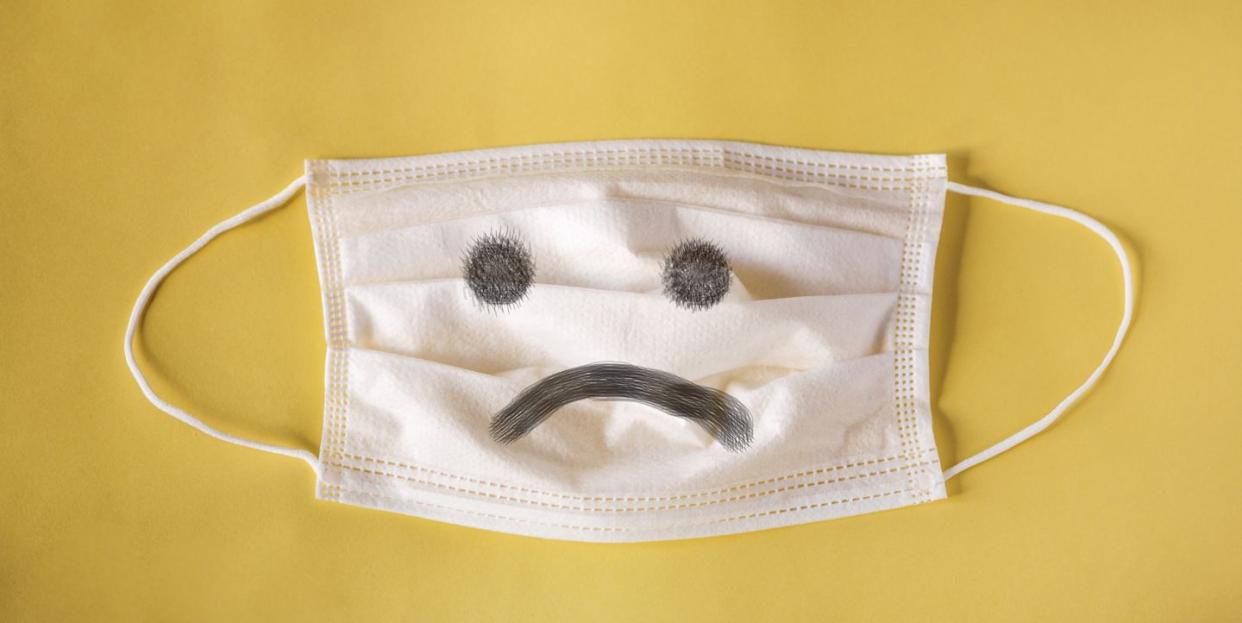Surprising No One, Americans Are the Unhappiest They’ve Been in 50 Years

Americans are the unhappiest they’ve been in about 50 years, according to new data from NORC at the University of Chicago.
Researchers found that only 14% of people called themselves “very happy,” down from 31% in 2018.
Reports of feeling lonely have also doubled since 2018.
Americans are the unhappiest they’ve been in about 50 years, according to new data from NORC at the University of Chicago. Morale hasn’t been this low since scientists started tracking general happiness with the General Social Survey, which has collected data at least every other year since 1972, per the Associated Press (AP).
For the first wave of the COVID Response Tracking Study—to be conducted before, during, and after the novel coronavirus outbreak—researchers surveyed more than 2,000 adults representative of U.S. households via the web and phone in May.
After analyzing the responses, researchers discovered that only 14% of participants called themselves “very happy”—an all-time low. In 2018, the last year researchers collected data on general attitude and behavior, 31% of Americans identified as “very happy.”
Reports of feeling isolated or lonely have also doubled since 2018 (50% vs. 23%), an expected development from the ongoing COVID-19 pandemic, which forced most of the country into quarantine during the spring.
“Findings from the first wave of 2020 data suggest that the unique and unprecedented coronavirus crisis is having a negative impact on the well-being of Americans,” the researchers from NORC at the University of Chicago wrote in a statement. “Exposure to the coronavirus, either personally or geographically in a highly-impacted area, is linked with greater feelings of loneliness and other negative emotional states.”
Other notable findings reported by the University of Chicago include:
More Americans (42%) believe that their children’s standard of living when they are older will be better than their own standard of living. This number was 57% in 2018, marking “the lowest level of optimism for the next generation since first measured in 1994.”
In 2018, only 10% reported feeling a lack of companionship often. That number rose to 18% in May 2020.
Feeling anxious, depressed, and irritable is also more common with 18% of Americans reporting these feelings in 2020 compared to 13% in 2018.
More Americans (30%) report losing their temper more often after the COVID-19 outbreak compared to the same feeling reported after 9/11 (20%) and President John F. Kennedy’s assassination (19%).
It’s also important to note that the interviews were conducted before a massive wave of nation-wide protests erupted following the police killings of George Floyd, Breonna Taylor, Tony McDade, and other Black Americans.
Until researchers collect more data later this year, there are no clear answers on how this summer’s Black Lives Matter protests are impacting the mental wellbeing of the country—especially for Black Americans—during a time of unrest.
“The public is reacting differently than after other national tragedies,” the researchers noted. “Additional waves of data will be collected over the coming months and will reveal how Americans’ responses to the coronavirus may be evolving over time.”
Support from readers like you helps us do our best work. Go here to subscribe to Prevention and get 12 FREE gifts. And sign up for our FREE newsletter here for daily health, nutrition, and fitness advice.
You Might Also Like

